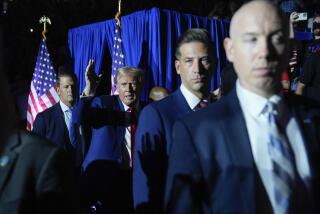Clinton Chides Dole for Changing His Stand on Gun Bill
- Share via
CHARLOTTE, N.C. — Appearing before a gathering of the National Assn. for the Advancement of Colored People that his rival, Bob Dole, had shunned, President Clinton taunted the Republican presidential hopeful for fudging his position on assault weapons.
As Clinton repeated his oft-stated vow to veto any bid to repeal the ban on certain types of military-style automatic weapons, leaders of the NAACP chastised Dole for having skipped their convention, attending the baseball All-Star game in Philadelphia on Tuesday night instead.
A senior Dole aide blamed the snub on bad staff work.
For his part, Dole refused to clarify his remarks on the assault-weapons ban, saying “that was yesterday’s news” when asked about it.
Tuesday, Dole seemed to moderate his policy on such weapons, saying that the nation had “moved beyond” the debate over the wisdom of outlawing them and said he wanted to talk about other things. But he avoided saying directly whether he still favored repealing the ban or whether, if elected, he would veto a repeal effort. That left the National Rifle Assn. insisting that Dole was still on their side--committed to ending the ban.
Clinton took full advantage of Dole’s ambiguity. “I will say one thing that the Republican candidate for president has not said-- and probably will not and cannot say. I will veto any attempt to repeal the assault-weapons ban,” he said to the cheers of the 2,000 NAACP members in the Charlotte Convention Center.
Clinton mocked Dole and other Republicans who in the past have opposed bills to block sales of assault weapons.
“I couldn’t believe it,” he said. “They want to take Uzis out there and shoot at the deer. Wild turkeys fly fast; you need lots of bullets. I’m kind of laughing to keep from crying about this.”
NAACP President Kweisi Mfume, a former Democratic congressman from Maryland, introduced Clinton by chiding Dole for turning down an invitation to speak to the 87-year-old civil rights group.
Dole said he had turned down the invitation to speak Tuesday or Wednesday because of a “scheduling conflict.” On Tuesday morning, Dole spoke in Richmond, Va., just over 250 miles from Charlotte, then flew to Philadelphia to attend the baseball game that night.
Mfume, drawing a contrast with the likely GOP nominee, characterized Clinton as “one who recognizes the need to be president of all the people . . . one not afraid to talk about the vexing issue of race in this country.”
And then, in a line that brought the delegates to their feet with cheers of “Four More Years,” Mfume said, “The president of the United States didn’t go to an All-Star game.”
Dole spokesman Nelson Warfield expressed regret that the candidate had turned down the NAACP and blamed a staff error, rather than a deliberate snub. “I wish he could have been there,” Warfield said. “He has a lot to say on race relations and he could have brought a message of economic opportunity and empowerment.”
The NAACP delegates were not mollified.
In Washington, Rep. Donald M. Payne (D-N.J.), chairman of the Congressional Black Caucus, called Dole’s absence “an affront to the organization.”
Campaigning in Hartford, Conn., and in Manchester, N.H., Dole tried to shift the debate to his charge that Clinton has failed to live up to his campaign promise to “end welfare as we know it.”
In Hartford, he spoke at a community action agency, where he praised Connecticut’s welfare reform program as instituted by GOP Gov. John Rowland. The program has more than doubled the number of recipients who have found jobs, officials say. The success has been due partly to expanding the resources devoted to child care, said Joyce Thomas, the state’s head of health and human services.
Dole argued that Republicans would make programs run better by allowing the states more leeway. “Let’s give the states a chance,” he said.
Clinton began his 50-minute address to the NAACP with a recitation of his administration’s economic record and a review of his priorities in education, welfare and the environment.
He then launched into a meditation on the problem of race relations in the United States and around the world, blaming endemic racial and ethnic violence on “a flaw in the human spirit.”
“What is leading to all this terrorism around the world?” Clinton asked rhetorically, citing the tribal slaughter in central Africa, religious violence in Northern Ireland, ethnic murder in the former Yugoslavia and continuing bloodshed in the Middle East.
“I think it has to do with human nature being vulnerable every day to taking the easy way of defining ourselves in terms of who we’re not, instead of who we are; defining ourselves in terms of who we can look down on, instead of what we can look up to.
“And nobody has ever perfectly solved this problem,” Clinton continued. “I know that even though we desegregated our schools and threw racism out of public facilities and elected African Americans and Hispanics and Asian Americans to Congress, passed civil rights laws, this job is a never-ending job, here and around the world. A never-ending job.”
Times staff writers Edwin Chen and Sam Fulwood III contributed to this story.
More to Read
Get the L.A. Times Politics newsletter
Deeply reported insights into legislation, politics and policy from Sacramento, Washington and beyond. In your inbox twice per week.
You may occasionally receive promotional content from the Los Angeles Times.










